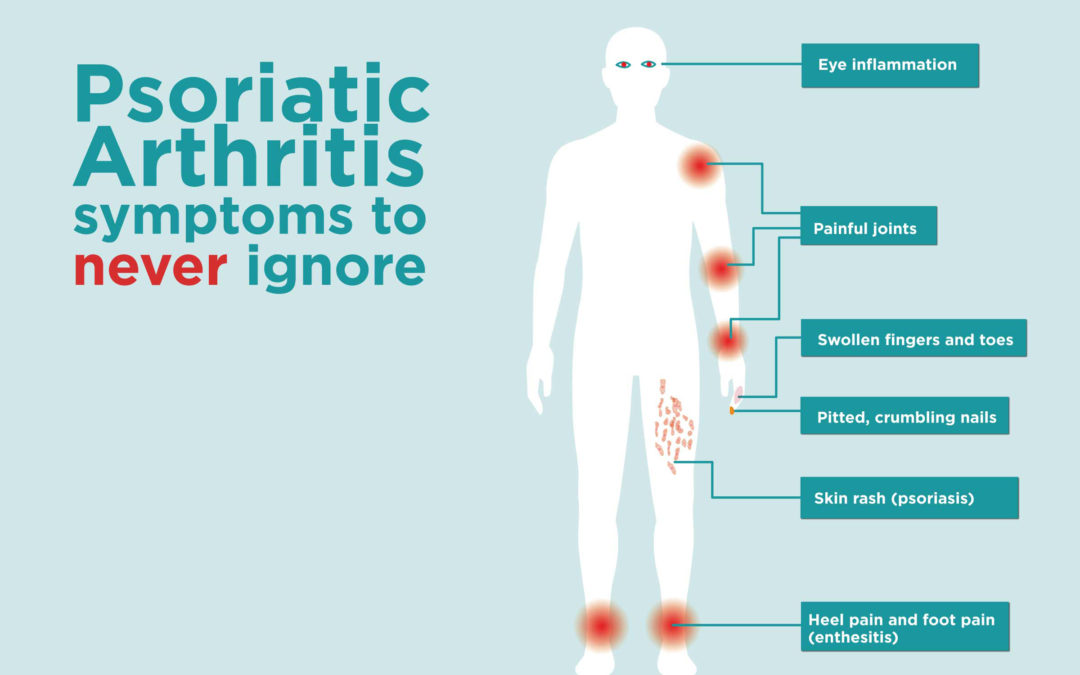The skin is the biggest organ we have in our body so it is vital we take care of our skin. What happens when your body decides to attack the skin thinking it is the enemy? Many of those who have Psoriatic Arthritis (PsA) which is a combination of having Psoriasis and Arthritis. Psoriatic arthritis is a condition that involves joint inflammation and skin inflammation disorder. Not everyone who has Psoriasis has Arthritis.
7.5 million people in the United States have Psoriatic Arthritis. I know several people in my life who have Psoriatic Arthritis and their first symptom was having a scaly rash on their skin which is called Psoriasis. This rash is red and is covered with flaky white scales that itch. Arthritis is stiff joints, redness around the joint area, and swelling and oftentimes it is hot to the touch. The skin condition starts first and it happens during adolescence and the arthritis part starts between the ages of 30 to 50.
There are five types of Psoriatic Arthritis:
- Distal Interphalangeal Predominant: this affects just the toes and the fingers
- Asymmetric Oligoarticular: affects one side of the body. Asymmetric and Symmetric Oligoarticular PsA are the most common type of PsA.
- Symmetric Oligoarticular: affects both sides of the body. Asymmetric and Symmetric Oligoarticular PsA are the most common type of PsA.
- Spondylitis: affects the joints in the spine
- Arthritis Mutilans: Fewer than 5 percent of those affected have this type. This is severe damage to the joints where it deforms the hands and feet and other joints.
There are those who have more than one type of Psoriatic Arthritis. The symptoms are the same as having Rheumatoid Arthritis.
The Symptoms of PsA are:
- Swollen fingers and toes
- Foot pain
- Lower back pain
- Skin Rashes
This form of arthritis, just like Rheumatoid Arthritis, is an autoimmune disease. The body’s immune system believes that healthy cells are the enemy and they begin to attack them. This causes the skin rashes and redness, swelling, and pain and an overproduction of skin cells.
Both genetics and environment play a big role in acquiring this autoimmune disease. Here are some samples of factors:
- Family history of this disease
- Physical trauma
- Environmental bacteria
- Environmental virus
The main treatment for this disease is to control inflammation in the body. Your Rheumatologist will guide you to the right combination of medications to help your body. They do this in several ways:
- DMARD medications such as Arava, Methotrexate, Sulfasalarine
- Immunesuppresants medications such as Azethioprine, Cycolsporine
- Biologics medications such as Abatacept, Adalimumab, Certolizumab, Etanercept, Infliximab, Talz, Cosentyx, Xelfariz, Stelara
- Enzyme inhibitor medications such as Apremilaast which is a pill that blocks the protein PDe-4
- Steroids
- Narrow band UVB phototherapy
There are other treatments you can do on your own, such as eating well for your body and moving your body. It is recommended that you eat a Mediterranean eating plan and focus on the foods that fight inflammation.
>>>Read How to Eat a Mediterranean Diet
The foods that fight inflammation are:
- Cold water fish such as tuna, mackerel, cod, haddock, sardines, anchovies, pollock, trout. Be sure to get wild caught
- Colorful fruit
- Colorful vegetables
- Flaxseed
- Olive oil
- Pumpkin seeds
- Walnuts
Discover other foods that help you. This will be personal to you.
Foods to limit:
- Fatty red meat
- Processed foods
- Refined sugar
- Dairy
Exercise or what I like to call, Movement, is needed to keep the joints and tendons loose and flexible and it also keeps inflammation in check. It also lessons the works load of the joints which helps you too.
Here are My Tips to Help You Live Well with PsA:
- Break your bad habits such as smoking. They have some great programs and Karen will guide you to the best one that works for you.
- Eat well. Try the Mediterrean Diet, you can also try AIP Paleo. Just eat more fish and vegetables and fruit.
- Move your joints. Even five minutes will benefit you.
- Relieve the stress in your life. Try essential oils, meditation, something that you enjoy.
- Use hot and cold packs to help your joints when they are inflamed.
- Find supplements and spices such as turmeric, ginger that help with inflammation.
- Be open to exploring different things that will make your life easier.
- Talk to a counselor about the emotions that come up when you are hurting or living with a chronic condition.
- Keep a list of medications in your phone or purse. This makes life a lot easier.
The Wellness Works NW Team understands living as well as possible with a chronic illness. We, ourselves, live with chronic conditions and know the struggle to live well as possible. We would love to help you come up with a wellness plan or eating plan or movement plan to guide you to your best life.
Here are some links I would like to share with you:
- About Psoriatic Arthritis by National Psoriasis Foundation Staff
- Everything You Need to Know About Psoriatic Arthritis by Stephanie Watson, Verneda Lights and Elizabeth Boskey, PhD and medically reviewed by Debra Sullivan, PhD, MSN, RN, CNE, COI for Health Line
- Let’s Go Mediterranean by Karen G Clemenson for Wellness Works NW
- Psoriatic Arthritis by American College of Rheumatology Staff
- Psoriatic Arthritis by Arthritis Foundation Staff
- Psoriatic Arthritis by Mayo Clinic Staff
- Psoriatic Arthritis by U.S. National Library of Medicine Staff
- Psoriatic Arthritis by Versus Arthritis Staff
- Psoriatic Arthritis Health Center by WebMD Staff
- Image Credit: Psoriatic Arthritis Symptoms You Can’t Afford to Ignore by Jessica Brown for Global Healthy Living Foundation: Creaky Joints
Related Articles
 Jamie Holloway is a co-owner of Wellness Works NW and she is also our Research Manager and writes our Chasing Wellness with Jamie Holloway and Dear Jamie columns. Jamie is also an Independent Wellness Advocate at dōTERRA. She lives in the Portland, Oregon area. Since October 2011 she has been sharing her Journey Toward Health and Wellness with Vasculitis through her blog at JamieChasesButterflies.com. We hope you are as inspired as we are with the raw candor Jamie uses in her writing. If you would like to help support Jamie’s writing efforts please Donate now.
Jamie Holloway is a co-owner of Wellness Works NW and she is also our Research Manager and writes our Chasing Wellness with Jamie Holloway and Dear Jamie columns. Jamie is also an Independent Wellness Advocate at dōTERRA. She lives in the Portland, Oregon area. Since October 2011 she has been sharing her Journey Toward Health and Wellness with Vasculitis through her blog at JamieChasesButterflies.com. We hope you are as inspired as we are with the raw candor Jamie uses in her writing. If you would like to help support Jamie’s writing efforts please Donate now.













